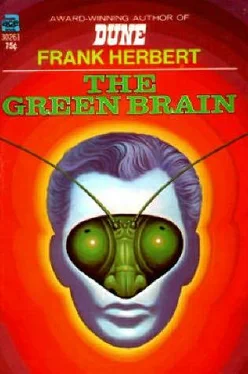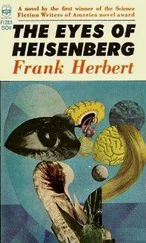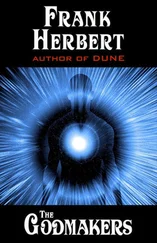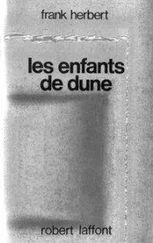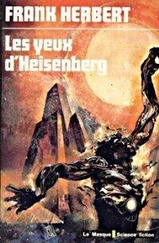Perhaps someone’s already been found , he thought.
He allowed Vierho to lead them toward the trucks.
IT WAS a cave high above wet black rocks of a Goyaz river gorge. In the cave, thoughts pulsed through a brain as it listened to a radio on which a human announcer related the day’s news: riots in Bahia, bandeirantes lynched, paratroopers landed to restore order…
The radio, a small battery-powered portable, made a tinny racket in the cave that irritated the brain’s sensors, but human news had to be monitored… as long as the batteries held out. Perhaps biochemical cells could be used after that, but the brain’s mechanical knowledge was limited. Theory it had in abundance from filmbook libraries abandoned in the Red, but practical knowledge was another matter.
There’d been a portable television for a while, but its range had been limited and now it no longer worked.
News ended and music blared from the speaker. The brain signaled for the instrument to be silenced. The brain lay there then in the welcome silence, thinking, pulsing.
It was a mass about four meters in diameter and half a meter deep, knowing itself as a “Supreme Integration,” filled with passive alertness, yet always more than a little irritated by the necessities which kept it anchored to this cave sanctuary.
A mobile sensory mask which it could shift and flex at will—forming now a disc, then a membranous funnel, and even the simulation of a giant human face—lay like a cap across the brain’s surface, its sensors directed toward gray dawnlight at the cave mouth.
The rhythmic pulsing of a yellow sac at one side pumped a dark viscous fluid into the brain. Wingless insects crawled over its surface membranes—inspecting, repairing, giving special foods where needed.
Specialist hives of winged insects clustered in fissures of the cave, some producing acids, some breaking down the acids for their oxygen, some digesting, some providing the muscles for pumping.
A bitter-clean acid smell permeated the cave.
Insects flew in and out of the dawnlight. Some paused to dance and sway and hum for the brain’s sensors; some used modulated stridulations to report; some appeared in special groups aligned a special way; some formed complex patterns with changes in coloration; some waved antennae in intricate ways.
Now came the relay from Bahia: “Much rain—wet ground; the burrows of our listening post collapsed. An observer was seen and attacked, but a monitor brought it to safety by tunneling from the river. The river tunnels brought collapse of a structure there. We left no evidence except what was seen of us by the humans. Those of us who could not escape were destroyed.
“There were deaths among the humans.”
Deaths among the humans , the brain reflected. Then the radio reports were correct .
This was disaster.
The brain’s oxygen demand increased; attendant insects sped over it; the pumping rhythm increased its pace.
The humans will believe themselves attacked , the brain thought. The complex defense posture of humankind will be activated. To penetrate that posture with calm reasoning will be most difficult if not impossible .
Who can reason with unreason?
The humans were very difficult to understand with their gods and their accumulation patterns.
“Business” was what the books called their accumulation pattern, but the sense of it eluded the brain. Money could not be eaten, it stored no apparent energy, and was a poor building material. Wattle and daub taipa houses of the poorest humans had more substance.
Still, the humans grubbed for it. The stuff had to be important. It had to be every bit as important as their god-concept, which appeared to be something like a supreme integration whose substance and location could not be defined. Most disturbing.
Somewhere, the brain felt, there must be a thought-mode to make these matters understandable, but the pattern escaped it.
The brain thought then how strange it was, this thought-mode of existence, this transference of internal energy to create imaginary visions that were in fact plans and schemes and that sometimes must move for a way along non-survival paths. How curious, how subtle, yet how beautiful was this human discovery which had now been copied and adapted to the uses of other creatures. How admirable and elevated it was, this manipulation of the universe that existed only within the passive confines of imagination.
For a moment, the brain tested itself, attempting to simulate human emotions. Fear and the hive-oneness—these it could understand. But the permutations, the variance of fear called hate , the blister-sided reflexes—these were more difficult.
Never once did the brain consider that it once had been part of a human and subject to such emotions. Intrusion of those thoughts had been found irritating. They had been excised at its own direction. Now the brain was only vaguely like its human counterpart, larger, more complex. No human circulatory system could support its needs for nourishment. No merely human sensory system could supply its voracious appetite for information.
It was simply Brain , a functional part of the superhive system—more important now than even the queens.
“Which class of humans was killed?” it asked.
The answer came in low stridulations: “Workers, females, immature humans and some barren queens.”
Females and immature humans , the brain thought. It formed on the screen of its awareness an Indian curse whose source had been excised. With such deaths, the human reaction would be most violent. Quick action was imperative.
“What word from our messengers who penetrated the barrier?” the brain asked.
The answer came: “Hiding place of the messenger group unknown.”
“The messengers must be found. They must stay in hiding until a more opportune moment. Communicate that order at once.”
Specialist workers departed at once to obey the order.
“We must capture a more varied sample of humans,” the brain commanded. “We must find a vulnerable leader among them. Send out observers and messengers and action units. Report as soon as possible.”
The brain listened then, hearing its orders being obeyed, thinking of the messages being carried off across the distances. Vague frustrations stirred in the brain, needs for which it had no answers. It raised its sensory mask on supporting stalks, formed eyes and focused them upon the cave mouth.
Full daylight.
Now it could only wait.
Waiting was the most difficult part of existence.
The brain began examining this thought, forming corollaries and interweavings of possible alternatives to the waiting process, imagining projections of physical growth that might obviate waiting.
The thoughts produced a form of intellectual indigestion that alarmed the supporting hives. They buzzed furiously around the brain, shielding it, feeding it, forming phalanxes of warriors in the cave mouth.
This action brought worry to the brain.
The brain knew what had set its cohorts into motion: guarding the precious-core of the hive was an instinct rooted in species survival. Primitive hive units could not change that pattern, the brain realized. They had to change, though. They had to learn mobility of need, mobility of judgment, taking each situation as a unique thing.
I must go on teaching and learning , the brain thought.
It wished then for reports from the tiny observers it had sent eastward. The need for information from that area was enormous—something to fill out the bits and scraps garnered from the listening posts. Vital proof might come from there to sway humankind from its headlong plunge into the death-for-all .
Читать дальше
